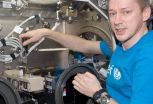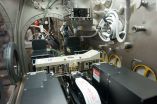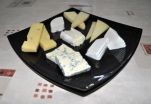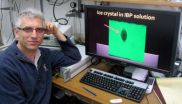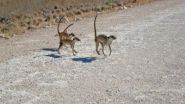HOUSTON, TX, February 20, 2013 (Press-News.org) James Bond might be the first to tell you that a well-shaken martini is a vast improvement over one that has settled and separated. A good mixture depends on understanding exactly how much to agitate a drink, as well as how quickly the ingredients will settle and if there are other mediating factors, such as temperature. If Bond really wanted to understand the science of his spirits, he could follow the examples of researchers who sent fluid mixture experiments to the International Space Station.
The Selectable Optical Diagnostics Instrument-Influence of Vibrations on Diffusion of Liquids, or SODI-IVIDIL, investigation addressed the question of fluid physics fundamentals while looking at how heat and particles move through liquids in microgravity. The scientists who conducted the space station investigation from October 2009 to January 2010 were not interested in cocktails, however, but instead wanted to verify current math models to predict liquid mixture behavior.
Information from this study adds to the collective knowledge of fluid physics, advancing that area of science.
"Any research initiative is a small step forward, a venture into a land of unknown, toward a better understanding of nature and the world we are living in," said Valentina Shevtsova, Ph.D., principal investigator for SODI-IVIDIL at the Microgravity Research Center, ULB, Belgium. "Before this venture is realized, much work is needed to increase the chance of success. And this is where the pre-experimental computer and theoretical studies rule."
Researchers knew that studying reduced convection buoyancy -- the transfer of heat by movement -- aboard the space station could reveal fluid mixture behaviors hidden by gravity in experiments on the ground. Still, they needed to check if there were any side effects from the minor on-orbit tremors, known as g-jitter, such as crew movements or mechanical vibrations that could distort data.
To perform this series of experiments, researchers used the SODI optical instrument, which also helps with other station studies, such as SODI-Colloid. The European Space Agency, or ESA, built the SODI instrument for use aboard the station for fluids research in the space environment. The crew put the IVIDIL sample cells into SODI for processing and observation. The liquid binary solution samples, which are essentially fluids made up of a two-part mixture -- similar to if Bond had vodka and water instead of his trademark martini -- were then tested for their response to various vibrations.
After 55 repetitions of the experiment, researchers found that only major space station vibrations caused impacts, such as orbital debris avoidance maneuvers or dockings and undockings of spacecraft. The more common minor movements that are part of daily life aboard station did not influence the samples.
"The SODI-IVIDIL experiment clearly showed that onboard jitters do not affect fluid investigations of this type in microgravity, paving the way for future studies with more complex samples," said Shevtsova.
This is the first successful station study to gauge the impact of on-orbit g-jitter, providing benchmark values for future fluid diffusion experiments. These results provide proven numbers for equations to predict movement of liquids, which were not possible to obtain on Earth, due to gravity.
Now that scientists know their numerical models are reliable, they can use them with confidence as a reference point as they move forward with additional research in the area of fluid physics and in physical and life science studies aboard station. This is good news for future station investigations, such as Diffusion Coefficients in MIXtures, or DCMIX, and Vibrational Phenomena In Liquids, or VIPIL, as well as applications for space equipment.
"The studied phenomenon in SODI-IVIDIL allows for the control of fluids in microgravity important for material processing, space-enabling operations and even life support," said Shevtsova. "European scientists expect to obtain bullet-proof benchmark results from future space station studies with three component mixtures, such as DCMIX, to validate ground experimental techniques."
So what does this study mean for those of us on Earth, since we are not likely worried about Bond's quest for the perfect martini in an orbital lounge? These results actually have direct applications to petroleum research.
Data from these space studies may help the oil industry generate formulas to predict correct measurements for the liquid to gas ratio in potential wells. This information aids geophysics and mineralogy experts as they evaluate the capacity of reservoirs -- collections of natural resources that lay hidden in the ground. Using these formulas could prevent costly mistakes during exploration, leading to more accurate and affordable speculation.
"The convection flows created by vibrations in microgravity are similar to the convection created on the ground by buoyancy," said Shevtsova.
While SODI-IVIDIL examined a binary solution, it paved the way for more complex mixture research on orbit by showing that g-jitter would not complicate the results. For instance, DCMIX will look at a three part liquid and other, more complex solutions will follow. DCMIX is scheduled to launch aboard a Russian Progress spacecraft to the space station in the summer of 2013. Since oil is a multicomponent mixture, as this microgravity fluid physics research continues to evolve, so also will the advances made in exploration in space and on Earth.
For more information on past, ongoing, and future ISS research activities, including research results and publications, visit:
http://www.nasa.gov/mission_pages/station/research/index.html
If you are interested in subscribing to updates from the ISS Program Science Office, visit:
https://lists.nasa.gov/mailman/listinfo/iss-program-science-group
For more information about the International Space Station, visit:
http://www.nasa.gov/station
Fluids in Space, Shaken Not Stirred
RELEASE: JR13-011
2013-02-20
ELSE PRESS RELEASES FROM THIS DATE:
SignalPush Now Offers a Real-Time Newsfeed and Chart Pattern Recognition Service
2013-02-20
SignalPush combines efforts with two of the leading FOREX companies to add value for clients.
Autochartist is the "world's most advanced tool for the automatic identification of chart patterns and Fibonacci patterns." Updates are sent to the SignalPush software often showing users updated chart patterns and trade opportunities. Included in the information provided is the quality of the signal, the type and the interval. All of these things will greatly increase the chances of a profitable trade.
FXWire Pro offers a real-time newsfeed, giving traders a ...
Laura Wellington: HuffPost Gives Rave Review to The Four-Star Diet!
2013-02-20
It's been less than two weeks since its official release and already, "The Four-Star Diet: Based Upon The Wisdom Of General Colin Powell & Other Ridiculously Brilliant Leaders" has seized a nation and crossed international borders into Canada, Europe, and Asia. The rapid takeover and powerful sales have been fueled by an enthusiastic and aggressive battalion of blogger support combined with stellar reviews, including that of Lisa Niver Rajna, blogger for The Huffington Post.
http://www.huffingtonpost.com/lisa-niver-rajna/dieting-is-war-are-you ... 68866.html
It ...
Young malaria parasites refuse to take their medicine, may explain emerging drug resistance
2013-02-19
New research has revealed that immature malaria parasites are more resistant to treatment with key antimalarial drugs than older parasites, a finding that could lead to more effective treatments for a disease that kills one person every minute and is developing resistance to drugs at an alarming rate.
University of Melbourne researchers have shown for the first time that malaria parasites (Plasmodium falciparum)in the early stages of development are more than 100 times less sensitive to artemisinin-based drugs, which currently represent a last line of defense against ...
Some cheeses exceed contaminant levels recommended by EU
2013-02-19
Researchers at the University of Las Palmas de Gran Canaria (Spain) have analysed more than 60 brands of cheese commonly available in supermarkets. The concentration of organochloride contaminants in the majority of the samples was lower than levels set by European legislation, but in a few cases it was higher. The scientists recommend that an eye is kept on polychlorinated biphenyls as they are carcinogenic. The majority of these compound concentrations appeared in organic cheeses.
"In general, chloride contaminant residue levels were low in the cheese samples that we ...
Gene linked to worse outcomes for melanoma
2013-02-19
Scientists at Queen Mary, University of London have identified a gene present in some melanoma which appears to make the tumour cells more resistant to treatment, according to research published today in the Journal of Experimental Medicine.
The scientists discovered that the gene TP63 is unexpectedly expressed in some melanoma and correlates significantly with a worse prognosis. It is hoped this new understanding of what makes some melanoma cells so difficult to kill will help inform the development of new therapies.
Melanoma is a form of skin cancer which usually appears ...
Not just cars, but living organisms need antifreeze to survive
2013-02-19
Jerusalem, February 17, 2013 – If you thought antifreeze was only something that was necessary to keep your car from freezing up in the winter, think again. Plants and animals living in cold climates have natural antifreeze proteins (AFPs) which prevent ice growth and crystallization of organic fluid matter. Without such antifreeze, living matter would suffer from frost damage and even death.
Production of such antifreeze proteins is one of the major evolutionary routes taken by a variety of organisms, including fish, insects, bacteria, plants and fungi. Understanding ...
Blood is thicker than water -- and blood plasma is, too
2013-02-19
The results are significant because they can help to improve our understanding of medical conditions, such as thrombosis, aneurysms and arteriosclerosis. The research team is publishing its results in Physical Review Letters and the American Physical Society has highlighted the work on its Physics website, placing it on the Focus List of important physics news.
Blood flows differently than water. Anyone who has ever cut themselves knows that blood flows viscously and rather erratically. The similarity between blood and ketchup is something not only filmmakers are aware ...
Researchers in Manchester find genetic key to preventing spine tumors
2013-02-19
Genetic medicine experts from Manchester Biomedical Research Centre at Saint Mary's Hospital and The University of Manchester have identified a new gene responsible for causing an inherited form of tumour, known as spinal meningioma.
Professor Richard Marias, Director of the Paterson Institute
Meningiomas are the commonest form of tumour affecting the brain and spine. Usually meningiomas can be removed by surgery and do not recur. Occasionally people can develop more than one meningioma or many members of the same family can be affected.
A team led by Dr Miriam Smith, ...
Subordinate animals as guinea pigs
2013-02-19
In their environment, wild animals are exposed to countless threats, be they predators, diseases or natural obstacles to get over, such as gorges or rivers. In the course of evolution, they have developed specific behavioural responses to allow them to deal with these risks. In recent times, numerous man-made threats have been added to the naturally-existing ones, such as dangerous roads to cross. On the evolutionary time scale, it is excluded that the animals have evolved a whole new repertoire of adaptive responses to these risks. Simon Townsend is a behavioural biologist ...
Reduced sea ice disturbs balance of greenhouse gases
2013-02-19
The widespread reduction in Arctic sea ice is causing significant changes to the balance of greenhouse gases in the atmosphere. This is shown in a new study conducted by researchers from Lund University in Sweden, among others.
According to the study, the melting of sea ice in the Arctic has a tangible impact on the balance of greenhouse gases in this region, both in terms of uptake and release. The researchers have studied the greenhouse gases carbon dioxide and methane both in the tundra and in the Arctic Ocean.
"Changes in the balance of greenhouse gases can have ...
LAST 30 PRESS RELEASES:
New “lock-and-key” chemistry
Benzodiazepine use declines across the U.S., led by reductions in older adults
How recycled sewage could make the moon or Mars suitable for growing crops
Don’t Panic: ‘Humanity’s Last Exam’ has begun
A robust new telecom qubit in silicon
Vertebrate paleontology has a numbers problem. Computer vision can help
Reinforced enzyme expression drives high production of durable lactate-based polyester
In Rett syndrome, leaky brain blood vessels traced to microRNA
Scientists sharpen genetic maps to help pinpoint DNA changes that influence human health traits and disease risk
AI, monkey brains, and the virtue of small thinking
Firearm mortality and equitable access to trauma care in Chicago
Worldwide radiation dose in coronary artery disease diagnostic imaging
Heat and pregnancy
Superagers’ brains have a ‘resilience signature,’ and it’s all about neuron growth
New research sheds light on why eczema so often begins in childhood
Small models, big insights into vision
Finding new ways to kill bacteria
An endangered natural pharmacy hidden in coral reefs
The Frontiers of Knowledge Award goes to Charles Manski for incorporating uncertainty into economic research and its application to public policy analysis
Walter Koroshetz joins Dana Foundation as senior advisor
Next-generation CAR-T designs that could transform cancer treatment
As health care goes digital, patients are being left behind
A clinicopathologic analysis of 740 endometrial polyps: risk of premalignant changes and malignancy
Gibson Oncology, NIH to begin Phase 2 trials of LMP744 for treatment of first-time recurrent glioblastoma
Researchers develop a high-efficiency photocatalyst using iron instead of rare metals
Study finds no evidence of persistent tick-borne infection in people who link chronic illness to ticks
New system tracks blockchain money laundering faster and more accurately
In vitro antibacterial activity of crude extracts from Tithonia diversifolia (asteraceae) and Solanum torvum (solanaceae) against selected shigella species
Qiliang (Andy) Ding, PhD, named recipient of the 2026 ACMG Foundation Rising Scholar Trainee Award
Heat-free gas sensing: LED-driven electronic nose technology enhances multi-gas detection
[Press-News.org] Fluids in Space, Shaken Not StirredRELEASE: JR13-011
